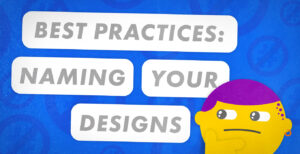As creatives, many of us have that little conspiracy theorist voice in the back of our heads telling us that our success is some fluke and that sooner or later, we’re going to be found out as frauds. Welcome, friends, to impostor syndrome. But maybe we can flip this way of thinking to actually recognize our own success rather than downplay it.
. . .
Recently, I was listening to an episode of the podcast Imaginary Worlds called “Designing Bojack’s World“. It followed artist (and Artist Shop owner) Lisa Hanawalt’s seemingly overnight jump from freelance illustrator to production designer of the hit Netflix show, Bojack Horseman. To me? This sounds like a crazy success story! So I was surprised when she said this:
“I feel good about [this show] now. It’s like ok, I finally figured out that I’m ok at this and that I’m not gonna be fired! I think that ‘impostor syndrome’ is super common and totally predictable and boring, but it’s a real thing. I guess if I really think about it, it’s like, ‘oh…I guess I really did sort of create this aesthetic for this show.’”
I listened to this line over and over again. As a creative who’s rewatched Bojack a few too many times, I found it oddly comforting to know that the person who designs this whole aesthetic I can’t get enough of – someone who, by all means, should feel like a boss at what they do – also suffers from that little conspiracy theorist voice in the brain known as impostor syndrome.
If you don’t know the term, you may know the feeling. It’s the sense that all of your success has been gained through sheer luck and that any moment, someone is going to discover you’re a fraud and give you the boot.
Are you nodding your head? If so, sit back, relax a little, and take comfort in the fact that you’re in very good (and wildly successful) company. Because one of the most amazing things about looking up impostor syndrome is that most of the people quoted talking about it are the last people you’d expect to have it. Besides Hanawalt, Tina Fey, Will Smith, Meryl Streep, and Maya Angelou have all talked about feeling like their success is all a big ruse, a fluke. In fact, perhaps the most famous quote about impostor syndrome is from Angelou herself:
“I have written eleven books, but each time I think, ‘uh oh, they’re going to find out now. I’ve run a game on everybody, and they’re going to find me out.’”
I think we can all agree that Maya Angelou is anything but a fraud. But that’s who impostor syndrome affects the most: successful people who are convinced they’re not as good at their craft as everyone thinks. Lori Widelitz-Cavallucci – a User Experience Designer who brings psychology into UX – describes it best on the “Impostor Syndrome” episode of the UX Podcast when she says that it “tends to be people who really are high achievers and have high expectations of themselves and have achieved a lot who feel it the most.”
It makes sense, really; people who are career-driven have higher expectations for themselves and tend to push themselves harder because of it. Business Insider has a great explanation for why this happens, which is that impostor syndrome drives us forward by making ourselves into our own competition that we’re constantly trying to one-up. After all, at the end of the day, who’s the one person you need to compete against the most when you’re pushing yourself to be better? You.
But as a creative person, I wanted to know why you can walk into any art studio, say “impostor syndrome, amirite?”, and get a collective “AMEN!” from the room. And what I heard on the UX Podcast changed how I thought about why this syndrome effects so many creatives specifically. They talked about how creatives are super susceptible to impostor syndrome because no two projects we work on are ever the same, and because the expectations for each project are constantly changing, it’s hard to fully feel like yes, we’ve nailed our craft, we’ve got this. As one of the podcast hosts said about UX:
“Everything we do is different, every project, every approach. So every project is unique and you’re going into new territory as a creative person every single time.”
And it doesn’t help that, thanks to technology and, to quote Childish Gambino, ‘Because the Internet’, the very tools and our own personal expectations of our work are constantly changing as well. As soon as you get used to using a certain lineup of textures or tools, boom: Kyle T. Webster comes up with a new brush pack to achieve expert-status with. As soon as you feel like you’re pretty good at what you do, boom: you find another illustrator setting a new standard. We all have such immediate access to things that can influence and change the way we see our work and ourselves.
I wanted to know why this syndrome affects creatives so much partly out of curiosity, but partly because it is comforting to know that 1: there’s a reason we feel this way as creatives that isn’t just internal and 2: even the most successful people in the art world have these thoughts. It takes the truth out of the “I don’t deserve my success” self-accusation. And maybe that’s how we should be thinking about impostor syndrome: as a signal and result of our own success, not as a sign that we don’t deserve our own success. Impostor syndrome is a double-edged sword. On the one hand, it comes from the fact that we’re pushing ourselves to be better. On the other hand, it can go very south and cause us to procrastinate out of fear of failure, make us run ourselves into the ground, hinder us, etc. But the biggest downside of it is that when you’re constantly feeling like a fraud in the face of your own success, you never give yourself credit for the work you’ve done to deserve the success that, yes, you have earned. You deserve a pat on the back from yourself once in awhile, not a kick in the butt.
So let’s try something: take the feeling of impostor syndrome and flip it. Whenever you get that feeling of not being a true master, of waiting for someone to find you out, of feeling like a fraud, think about it this way: you’re feeling this way because you are successful. Because you’ve worked hard, and your mind wants you to keep doing that. With impostor syndrome, feeling like you don’t deserve your success? Is actually a pretty good indication that you DO deserve your success and that you’re an all-around badass. And if you still don’t believe it, head to the bookstore and check out Maya Angelou’s lineup of work.
Illustration by Katie Lukes
Don’t feel like an impostor. Show the world your awesome work and try Artist Shops for free!


